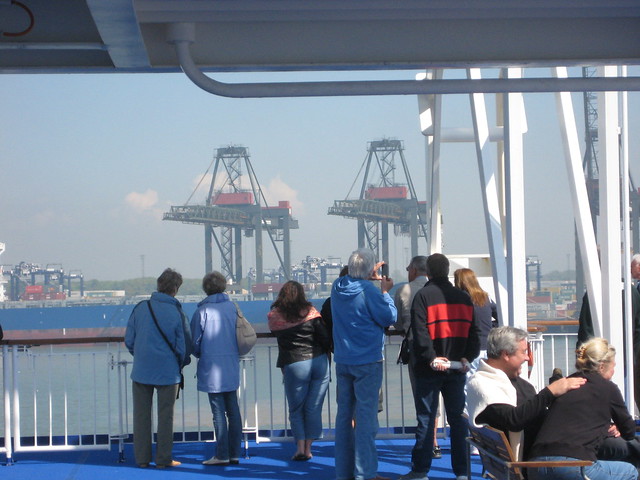At last, I’ve plucked up the courage to cycle from Old Street out to where I work in Hendon, up past Camden Town, turning right at Hampstead station then straight up all the way to Hendon then diving down an oblique footpath to arrive nearly opposite the university. I’ve also discovered Strava thanks to my technical guru Geoff Jones from where this map comes.
working life
My folded life
After ten years of uneventful bicycling in London, I have recently had a wheel and now a saddle stolen from my old racing bike. The latter has proved terminal as part of the seat post went too leaving my incomplete post siezed in the frame (its been there for years) and the bike shop telling me what I knew already but which I had been ignoring that my frame is broken in another place. The bike is beyond repair so its time to salvage the parts that I can and look for a new bike. Given my nomadic life I’ve decided to bite the bullet and order a folding bike from here.
I pick it up in 4 weeks [unfortunately my new date for the build is the week starting 14th December – that’s disappointing] while they build exactly what I want at the factory in Brentford.
It should look like this:

Homeward – arriving in Harwich in three hours
The demands of work have never been far away on this trip and I have missed a couple of things by accident not quite realising that if I were sitting in Denmark I wouldn’t be able to attend meetings in north London.
I had to check out of my motel by 11am which gave me many, rather too many hours to kill to get back the 120k to Esbjerg. The previous night I had tapped in the address of the ferry terminal into my GPS (or so I thought). I took the slow route toward Middlefart with the intention of finding some unsuspecting passer-by to photograph me standing, winking perhaps, next to a sign of the town name. (Thank gooodness I didn’t.) Having bumped into Jack Dowie, world expert in decision-making, earlier before I left, I was asking myself why I then took a turn that meant I would avoid this town with the childishly funny name and hit the motorway instead. Its not what I wanted to do but somehow presented with the opportunity to turn left toward the green motorway sign, I did it. In a motorway picnic area I had my first furtively made-at-the-motel-from-breakfast cheese sandwich. The sun was still shining beautifully. I worked out how to add a detour to my GPS route (I mean intentionally add one) and exited the rather boring motorway for some much nicer A class roads. By now I was not wanting the ride to end and thought about heading down south toward some other towns before going back up but, a little sooner than I expected, my GPS was telling me to turn off toward the ferry terminal. At the time I didn’t think it strange that we were nowhere near any water but I obeyed and started down what looked like a track to a farm with a cul-de-sac sign very visibly by it. In fact it turned out to be a farm track leading to a farm (but usually there is a barking dog in these situations – today there wasn’t). How strange. When I did arrive near the port I realised that probably human error accounted for this. Once I’d put in the correct address I was brought there easily.
There was one other biker and I got into the queue with him. He was riding a blue Yamaha trail bike (that exactly matched my colour) and had been camping for a fortnight in Denmark and Sweden. He showed me his impeccably packed bags which included a full toolkit. This has renewed my slightly flagging enthusiasm to go camping in June – next month! Looking back I can see that this traveller was years ahead of the ‘light is right’ bike movement, complete with soft luggage and extensive toolkit.


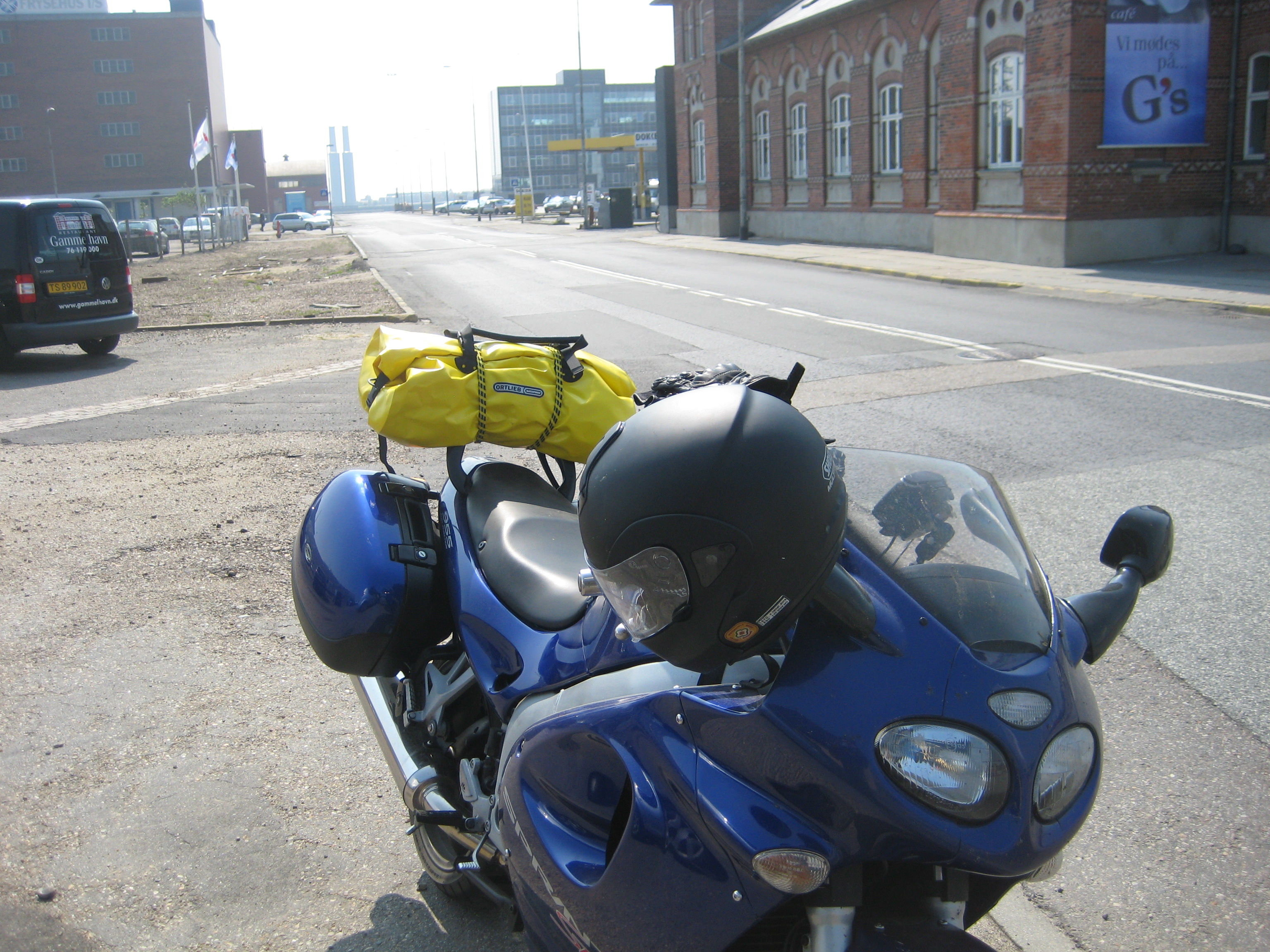
Also in the queue and sitting very firmly at the front was an English gentleman, heavily bearded in his 50s sitting in a beautifully restored 1936 three wheeler (I don’t know the make). On the ground next to the painstakingly polished chrome wheel arch is his similarly shiny chrome thermos flask. He is a fanatical engineer/restorer and also owns, he told me, a 1970s Ducati motorbike. He is reading a German ‘Oldtimer’ magazine which is about men restoring old cars and bikes – with photographs aplenty. He says I can keep it and I realise I’ve left it on the floor of the car deck. – I found it later.)
He engages in detailed mechanical conversation with the Yamaha rider who is also mechanically informed. I wonder for a while whether my next life project should be to become similarly informed and tooled up. I decide not to. Now I engage in talk with him. He is a ship designer. In fact he designed the enormous ship we are about to board. Its 5 years old which apparently is quite old for a ship. He left school at 14 and went into the navy where he started his design career and has been doing it ever since, spending much of the year in the few remaining European cities that still build ships, the Brits having stopped some years ago. He tells me that most ships are made in China or Korea nowadays. He has an intense gaze and speaks with a slight pressure. He’s fanatical about these mechanical things. He says he lives in Cornwall. Somehow I don’t think he has a wife and children as part of his life. We talk about VW Beetles we have both owned and I am shocked that I can remember mechanical details of these cars. My first one had 6volt electrics for example. I can imagine him as a mountaineer. I am attracted to something about the mechanical universe that men like him seem to live in, instead of mine full of doubt, complication and anxiety.
Once on the ferry I am now wise to their huge process (I meant to type ‘prices’) and have my supply of food and wine in my bag. My dinner on the way over cost £52, partly because I had a bizarre misconception about the exchange rate between Kroner and pounds ( remember I had Chablis with my meal). After catching up on some student work and my cabin picnic I settled down to watch Sans Soleil by Chris Marker after which my whole life began to feel poetic – even the continuous sound of the ship’s engine in the night when I went up on deck for a cigarette. I slept soundly and now it is 8.45 ship’s time. We are due to dock in Harwich at noon – no, 1pm Danish time.
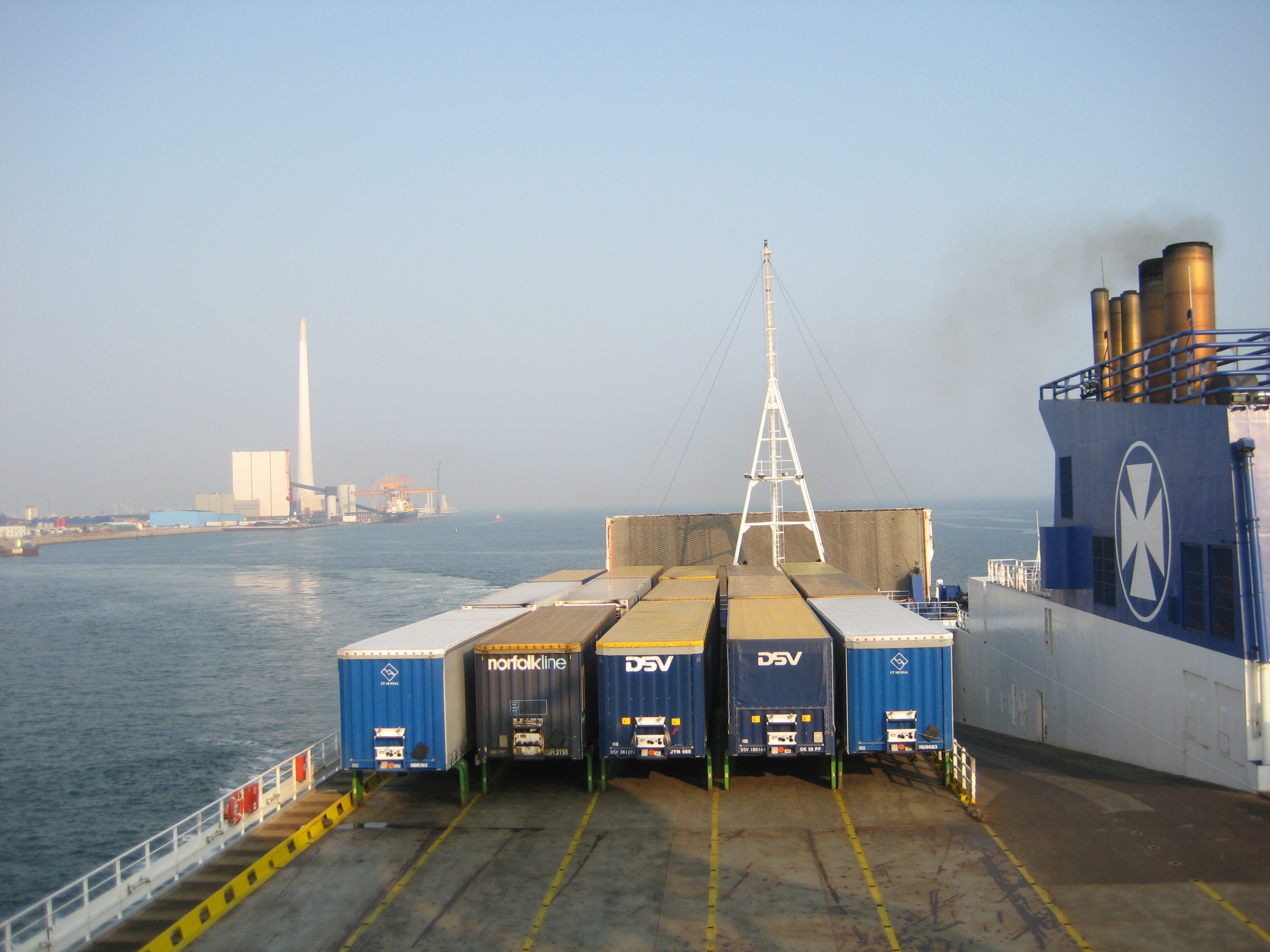
The journey from Odense to Esberg via a few detours was 88.8 miles; moving average 49mph, highest speed 91.5mph.
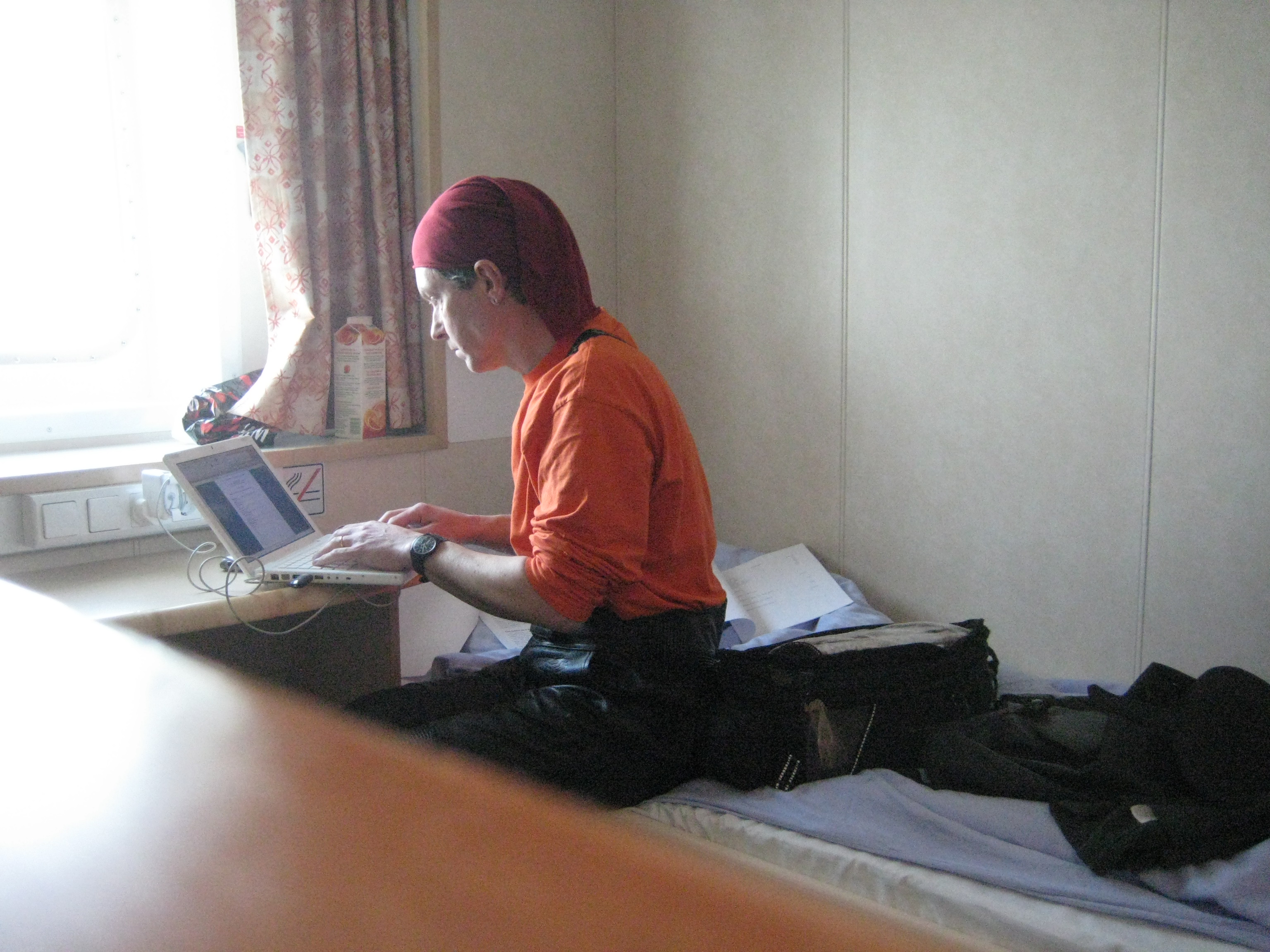
Hmm… not a good look. Luckily no one else was in the cabin
Marking some student work here for the last two hours has made me hugely grumpy, marking work for a ridiculous module that is just one more of nursing’s typical exercises in learning to express banal ideas in a convoluted and ultimately unenlightening framework and vocabulary. I feel so sorry for these students having to struggle to learn this pointless skill and how it humiliates them and does exactly the opposite to what higher education is capable of at its best. I need some fresh air on deck. I am obviously cabin crazy.
The journey home is an enjoyable ride through some beautiful essex and suffolk villages.
A week with Health Man and Society at the University of Southern Denmark
There’s something about going away and working somewhere else for a while that makes you feel valued in a way you often don’t feel when at the office. The unit Health, Man and Society is a collection of anthropologists, psychologists, a theologian and others with a nice band of PhD students investigating aspects of health. They seem very liberal and open minded about disciplinary orientation which is a refreshing change considering the way that some members of disciplines view the outsiders. Here’s their website.
And here they are having a tea break where they talk with each other. That’s amazing in itself.
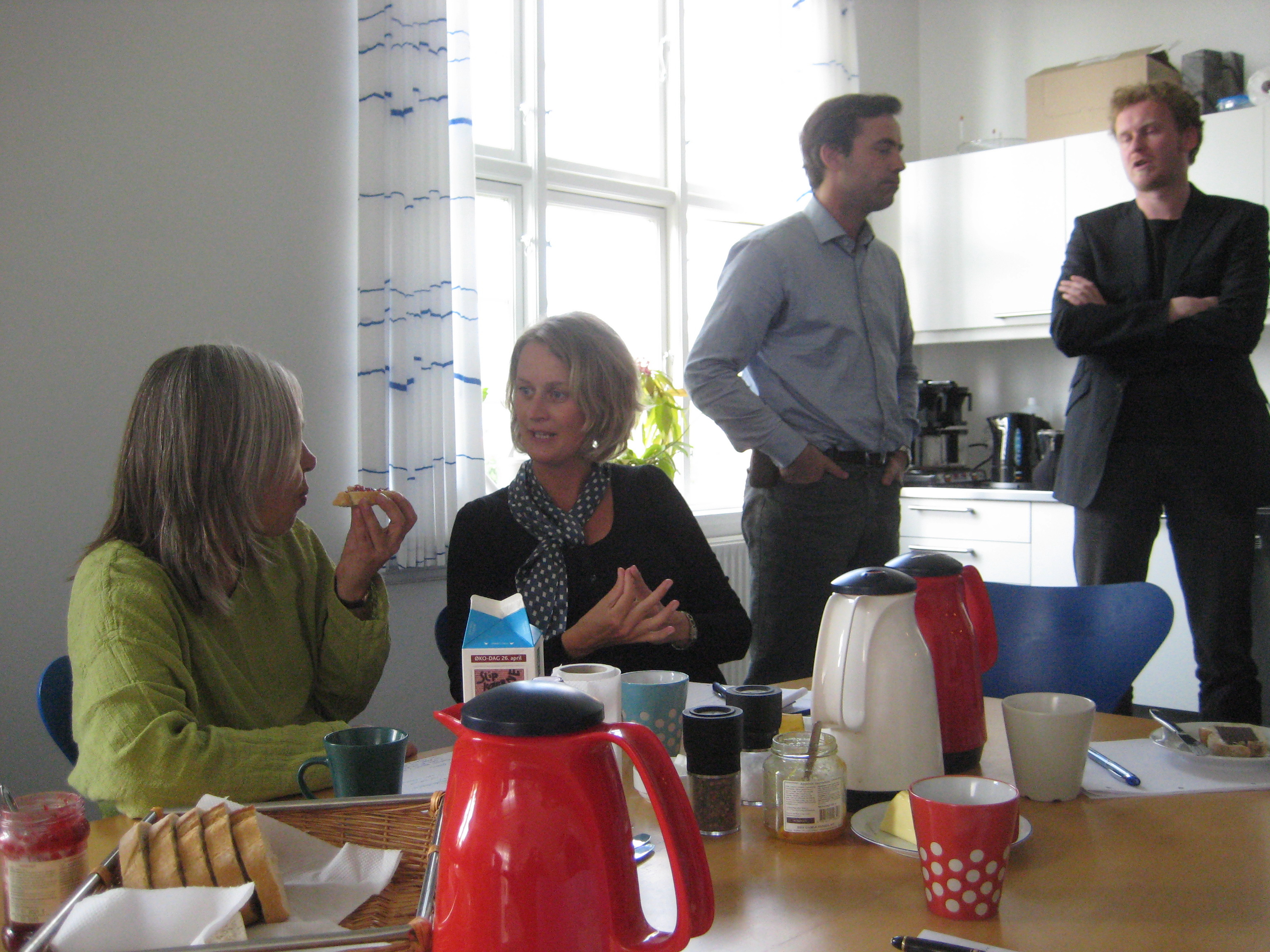
Tomorrow after dropping in briefly, I pack everything up into my panniers and drive back the 120k to Esbjerg to catch the ferry back to Harwich and home.
My half of the debate
Earlier today I spoke in a debate about where researchers in nursing should publish their research. The other speakers were rather more focused on the motion that I was. Here’s the text of my talk:
For debate RCN Conference Cardiff, March 2009
I want to talk about ‘impact’ and about ‘nursing’. I want to suggest to you that we may have strongly felt and cherished beliefs about both but that the ‘truth’ about both is more complex than we would like to believe – and perhaps actually rather unpalatable. I’d like to suggest that we are living in a kind of ideological fog when we talk and think about them.
First I’d like to suggest that research may be less important than we think in an activity as complex as healthcare. In healthcare delivery what is far more influential on patient experience, on outcomes and on job satisfaction is the amount of work to be got through, how good the managers are, what our colleagues are like – and alongside every exemplary intelligent and highly motivated nurse there are a few who seem to use work as a kind of therapy sandpit to act out their problems with insecurity and resentment. Also having a huge influence on what happens in healthcare are the contingencies of daily unpredictability (people ringing in sick, agency staff who are lost, students who have fights with each other, medical consultants to be intimidated by, managers to be bullied by) not to even mention the constant distorting effects of a series of bizarre government targets that were invented not to make the health service better for anyone but to solve some short term media embarrassment for ministers. In this context, and yes, this is a negative picture but it it is the context, I think it is fair to say that compared with addressing some of these problems, the potential impact of research is small. We don’t need a stream of new knowledge constantly fed to nurses who are struggling with other factors at the bedside or in the community. Whatever we might like to think, its just not the priority.
Second, no-one can do much about research findings because procedures, assuming they are followed, are decided by organisational committees and handed out in the form of protocols and standard operating procedures. The nurse who wants to introduce anything new needs the skills not so much of understanding arcane research methodology but of political and bureaucratic nous and muscular survival. As one nurse said in a focus group run by a colleague of mine recently ‘If you don’t act by the protocol the repercussions come back on yourself and you stand alone’. The space of healthcare delivery is a space where subjectivity is almost entirely erased in a realm of procedures, where nurses and others crave to act and be seen to act in a way in which they are ‘covered’. Nurses are awkwardly suspended between science and witchcraft. Like the chorus of women in poet T. S. Eliot’s Murder in the Cathedral, their overriding concern is ‘in avoiding notice’, they are ‘Living and partly living’ or like those in the Laodicean church in the book of Revelation who are not passionate but lukewarm and are ‘spewed out’ of God’s mouth. Nurses have been wanting to be ‘covered’ for thirty years at least and the rise of evidence based practice merely provides a new backdrop and a different vocabulary for this fearful and masochistic desire for invisibility and annihilation. So, research, innovation, impact and nursing do not fit easily together without looking through half closed eyes.
I want to return to the particular expectations placed on research within healthcare and then within nursing because it can inform our debate and gives some explanation for why we are all here this morning. Since the 1940s when the medical profession was corralled into the National Health Service in this country, governments have become increasingly bothered by that profession’s ability to eat up whatever resources were thrown into the system. At the same time, roughly – perhaps rather later, a sociology of the professions has recast these apparently altruistic and knowledgeable groups like medicine but also others as self-serving elites who masquerade as motivated by the needs of their clients but whose chief concern is in building up their sphere of influence possibly even at the expense of these clients. Their call for resources – in the case of medicine from the national purse – has been made convincing by the profession’s secret body of knowledge and by the privacy and emotive power of their relationship with individual patients. In the UK, governments have tried a number of approaches to curb this expensive professional power: general management, market forces, for example, but current arrangements look to be the most successful: a nice mixture of inspection agencies, new levels of recording activity and outcome, guidelines for practice, readily available ‘evidence’ and incentives – or rather penalties. So research in the healthcare arena (apart from being a potential money-spinner in the form of turning the NHS into a research field for pharmaceutical companies) is a battleground where various professional groups can demonstrate their effectiveness and be seen to be concerned with issues like treatment and outcome variation.
One strong impulse for nursing to take up the drive for research and evidence based practice is connected to the profession’s ever-present desire for credibility and a little status in a healthcare world dominated by other powerful professions. As soon as talk of evidence based activity was out of the bag it became a currency that was not likely to go away. Back in the late 80s and early 90s in response to a rising managerialism and cost-containment, nurses and others were busy in efforts aimed at demonstrating their ‘value for money’. Then, later in the 1990s, they needed to show that they were acting from a reliable scientific basis. Some looked to ‘evidence’ quite explicitly as another vehicle for demonstrating the so-called ‘value of nursing’, the value of having qualified nurses on the staff. Yet strangely, in recent focus groups that I have run with nurses , the influence of research came very low down on the list of forces affecting practice and decision-making. Organisational protocols featured far more prominently. The strange thing was that the focus group members did not see this kind of circumscribed working as compromising their professional autonomy and image. Quite the opposite. Telling me that the protocols in force in their NHS trusts had been developed from specifically nursing research (rather than medical research) they saw the existence of these instructions as a sign that nursing had finally come of age and as proof of its professional status. These groups also told me repeatedly that when research did influence practice it was through formal decision-making bodies and channels that they were not privy to. Generally, instructions seemed to come down to use this kind of dressing rather than that. So, among a risk-averse and arguably not hugely powerful group, this is perhaps a procedure that suits everyone and has a built-in opportunity to complain a little about being disempowered while actually finding the lack of personal autonomy deeply reassuring because you are ‘covered’.
Finally I want you to entertain the thought that we might share a fond overestimation of the importance of research altogether. Could it possibly be that the whole research enterprise and our belief in its usefulness and its ‘impact’ is part of a pervasive but desperate fantasy? And the fantasy at its most basic is something like this: that we live and breathe and work in a rational world that we can largely take control of through rational examination, planning and action.
In nursing and healthcare this belief has a particular flavour – which I have talked a little about.
The main value of this story is in boosting our morale, as enlightened Westerners, by letting us feel for a moment or two that we are masters and mistresses of our collective destiny. The rational abilities of the human mind have had to take on the roles and responsibilities previously allocated to gods, or God. But what if human events in any realm are largely determined by forces that we are barely aware of whether they be unconscious, as Freud would argue, or ideological, as Marx or Althusser might say? These, just to take two, might be influencing what goes on in healthcare organisations and policy making – and nobody acknowledges it because its in most people’s interests to maintain this pretence that everything important is out in the open.
So, publishing in high impact places? well, not all research in nursing has anything directly to do with practice (and this is worth remembering) and those researchers that are involved in such work, if they have a choice of one or the other, would perhaps be better off spending their time trying to influence decision-making agencies and bodies rather than individual nurses. Of course there will always be some individuals in units that are the exception, but I would argue that the in an increasingly standardised health service, the role of any individual journal-reading nurse in innovating practice is in fact quite small.
